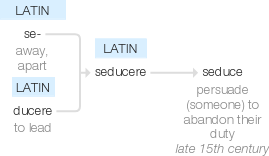Seduce
late 15th century (originally in the sense ‘persuade (someone) to abandon their duty’): from Latin seducere, from se- ‘away, apart’ + ducere ‘to lead’.
wiktionary
Borrowed from Latin sēdūcō(“to lead apart or astray”), from sē-(“aside, away, astray”) + dūcō(“to lead”); see duct. Compare adduce, conduce, deduce, etc.
etymonline
seduce (v.)
1520s, "to persuade a vassal, etc., to desert his allegiance or service," from Latin seducere "lead away, lead astray," from se- "aside, away" (see secret (n.)) + ducere "to lead," from PIE root *deuk- "to lead." Sexual sense, now the prevailing one, is attested from 1550s and apparently was not in Latin. Originally "entice (a woman) to a surrender of chastity." Related: Seduced; seducing.
Replaced Middle English seduisen (late 15c.), from French séduire "seduce," from Old French suduire "to corrupt, seduce," from Latin subducere "draw away, withdraw, remove" (see subduce).
